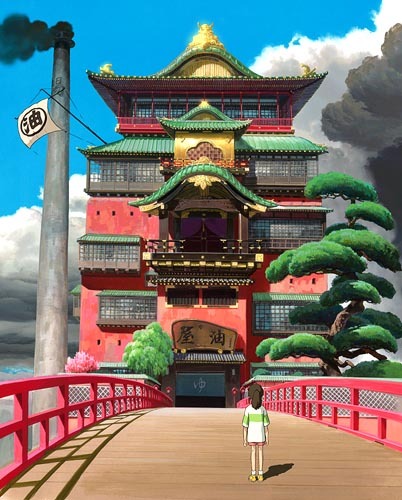Because I sure didn't. Then I was like HOLY WHAT. It's about Spirited Away.
I just took this from tumblr. Copy/paste works wonders.

I always wondered why the symbol “ゆ” (said “yu”) was on the door to the bath house. I asked my Japanese teacher, and he wasn’t too sure so I did a little research.
The symbol is used on the entrance to 温泉 (onsen) and 銭湯 (sento), or Japanese bath houses. The word “yu” is translated to “hot water”. So, makes sense to be on a bath house, yes?
Then I did more reading. During the Edo period, these public baths became popular for men because of women who started working at these communal baths, washing men and selling sex. These bath houses were called “yuna baro”. The woman were known as 湯女, or “yuna”. This directly translates to “hot water woman”. So basically, they were brothels. Guess what the woman who ran this bath house would be called?
ゆばば。
Yubaba.
(translates directly to “hot water old woman”)
Yubaba is the name of the woman who runs the bath house in Spirited Away. If you watch Spirited Away in Japanese, the female workers are referred to as yuna.
Chihiro was forced to change her name to Sen. Kinda like how strippers get names like “Candy”.
カオナシ/No-Face keeps offering Chihiro money. He “wants her”.
THEN I read interviews with Miyazaki. This was all put in intentionally. As we all know. Miyazaki’s stories are weaved with different themes and metaphors. He said he was tackling the issue of the sex industry rapidly growing in Japan, and that children being exposed to it at such early ages is a problem.
To me, this makes me respect Miyazaki even more as a film maker.
And also, frustrates me because so much gets lost in translation, and people see it as this cute childrens movie and this “master piece of animation” (which it definately is) instead of the real statement that it is.